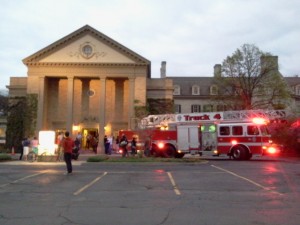I headed out to the Dryden Theater at George Eastman House (900 East Ave.) to see Sweet Sweetback's Baadasssss Song. I had been joking that I was going to see a blaxploitation film with a bunch of white people under the guise of watching for "educational purposes". In at least one way I was incorrect: Sweetback is not a "blaxploitation film" unto itself. It's more of a pressure release on a tense period of strong, established racism on all levels: individual, institutional, and systemic. It follows a black male prostitute running from a racist police force out to get him.
The film has its own cinematic style that draws from counterculture examples of the late 1960's and early 1970's. Vanishing Point, released the same year, comes immediately to mind as well as Zabriskie Point, released the year prior. Sweetback isn't just some simple story to write off, but a pointed [despite lacking "point" in its name] and poignant condemnation of the flagrant racial stereotyping permeating the entirety of commercial cinema. It transcends its story and calls attention to the power that mass media holds, and how that power — when exploited in response to fear (e.g. fear of a powerful black man) — can fuel hatred and abuse.
But the amusing anecdote in the whole thing was, just as Sweetback himself was becoming a man, the fire alarm sounded in the theater and we had to be evacuated.
Even 40 years later, the system still fears a black man.

